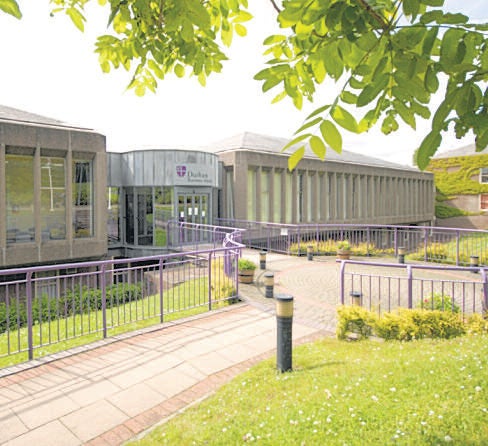Durham Business School

Your support helps us to tell the story
From reproductive rights to climate change to Big Tech, The Independent is on the ground when the story is developing. Whether it's investigating the financials of Elon Musk's pro-Trump PAC or producing our latest documentary, 'The A Word', which shines a light on the American women fighting for reproductive rights, we know how important it is to parse out the facts from the messaging.
At such a critical moment in US history, we need reporters on the ground. Your donation allows us to keep sending journalists to speak to both sides of the story.
The Independent is trusted by Americans across the entire political spectrum. And unlike many other quality news outlets, we choose not to lock Americans out of our reporting and analysis with paywalls. We believe quality journalism should be available to everyone, paid for by those who can afford it.
Your support makes all the difference.Age: 46
History: Durham is one of the oldest business schools in England. It was set up, along with the London and Manchester schools, as a result of the 1965 Franks Report. It is accredited by AMBA, EQUIS and AACSB.
Address: Based on the edge of the city, it's still part of the ancient university, but is housed in a modern building.
Ambience: The school's purpose-built facilities include a library, dedicated MBA IT suite and some on-site accommodation. The school is in Durham, in a green semi-rural setting next to a golf course. There is quick and easy access to Newcastle's lively café culture, bars and nightlife, together with international transport links. The Pennines, Lake District and wonderful Northumberland coast are nearby.
Vital statistics: The school caters predominantly to postgraduate executives and professionals. Its MBA programme allows students to create either a generalised or more specialised route for themselves. A range of one-year specialist Masters are also available.
Added value: Good choice of electives including entrepreneurship and organising for strategic advantage. The school was quick off the mark in establishing its distance-learning MBA in 1988. Its continual professional development programme ensures you will learn key skills in leadership, effective communication change management, and cross cultural awareness.
Easy to get into? Minimum requirements are three years' work experience and a degree or equivalent. Foreign students will need to prove their fluency in English.
Glittering alumni: Ian Emery, vice-president, Chase Manhattan Bank, London; John Cuthbert, managing director, Northumbria Water Group Plc; Hernan Giannasi, vice-president, HSBC investment banking, Argentina.
International connections: Around 80 per cent of full-time MBA students come from overseas. MBA staff jet off to the USA, Canada, Europe and Asia in search of students. The programme includes a week-long international study experience.
Student profile: The average age on the full-time MBA is 31, on the part-time it's 36 and on the distance learning MBA, 34. The male-to-female ratio is roughly 2:1.
Cost: £19,500 for the full-time MBA; £16,500 for the executive MBA; and £16,400 for the distance learning option.
Return on investment: MBAs receive an 83 per cent average salary increase after three years.
Who's the boss? Professor Rob Dixon.
Prospectus: +44 (0)191 334 5533; pg.bus@durham.ac.uk; www.dur.ac.uk/dbs
Join our commenting forum
Join thought-provoking conversations, follow other Independent readers and see their replies
Comments